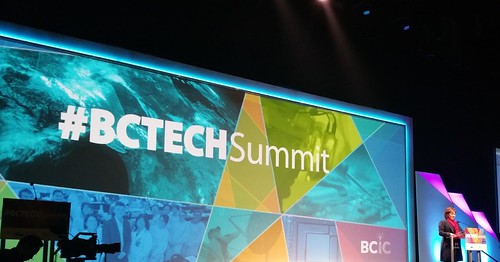The State of BC’s Digital Entertainment Sector
 Is Canada’s low loony helping our digital entertainment sector?
Is Canada’s low loony helping our digital entertainment sector?
Michelle Sklar caught up with Prem Gill, CEO of Creative BC, at the #BCTECH Summit this past week, to answer this question and much more.
MS: Tell us about Creative BC.
PG: We are a nonprofit agency, set up and supported by the provincial government, to drive the economic development of BC’s creative industries, specifically screen based industries such as, film and television, web series, music, books and publishing and digital media, which encompasses visual effects and animation.
MS: It seems like we have a number of tech conferences happening in Vancouver; how is #BCTECH Summit will be different?
PG: I have been going to SXSW for several years to the interactive portion, and it’s one of my favourite conferences, but it’s getting kind of giant. I find the interactive tech innovation side always really inspiring, and I if that is what this can build into. You know, I have seen everyone from Elon Musk, to Anne Marie Slaughter, to someone I have never heard of developing something really interesting. Because it’s not just the technology itself, it’s the thought around it, and how we are changing our culture.
We are looking at a cross section of technologies, we are not just thinking about people sitting in front of a computer building robots. Of course we are familiar with the great work of Genome BC and Fuel Cell. But also the Digital Entertainment sectors which are making a big impact on our economy.
MS: What can you tell us about the state of BC’s Digital Entertainment sector?
PG: We believe we are now the world’s biggest visual effects cluster, bigger than London, and a world leader in video gaming. Animation work has been going on a long time here, and we have been steadily growing. We have a talent base both of original IP creation, which can be somewhat rare for us when it comes to film and television, we do a lot of production services. And we have a number of world leading artists that work out of Vancouver.
How we continue to develop our talent is so important, which is why the K-12 coding initiative that was announced at the #BCTECH Summit is so interesting. Along with who are the markets that are going to consume our products, to immigration, as we need to bring in more talent to help us build that viable base.
MS: Do you think the low loonie is inviting for digital media companies to set up shop here, much like we see with film production?
PG: It’s not just one thing, it’s the same with production services, visual effects and animation, which are two sectors where large companies have opened offices here. Big studio facilities such as Sony Imageworks, Double Negative from London, Animal Logic from Australia, these are globally recognized leaders in their sectors.
This has always been a lucrative market for them, it’s the combination of the currency, tax incentives, the talent that we do have, and our proximity to LA.
MS: What do you think is important for developing and fostering talent and inviting greater participation in these exciting industries?
PG: I think our educational institutions have always been leaders here. You know I used to work at Telus, and I would do informational interviews and I would always tell people, learn to code, young women especially. Having said that, there is great value in a liberal arts education, I went to SFU and have a Communications degree. And there is a lot of value in creative and critical thinking. I think what’s interesting is it’s not just about teaching technical skills, it’s about innovation, and innovation is creativity and that kind of seeps into every level of it.
MS: What is Creative BC doing to encourage women to get involved in the creative industries whether on the technical skills side or in professional management roles?
PG: There hasn’t been anything focused on a demographic such as gender, but that is something we are working on. As we are going through our program planning for the next two years, a focus on diversity is definitely a priority for us.
In a study published by Women in View, 17% of key roles such as writers, directors and producers in Canadian television are women, and within that women of color and aboriginal women are pretty much invisible. This is a problem.
MS: What are some of the important trends we need to be paying attention to for 2016?
PG: In the Digital Entertainment industries, for sure virtual reality. And in Canada, and locally, we are poised to become a leader in that area. We will see continued growth of the visual effects and animation sectors as well. And I think that Vancouver is a city that creatives want to live in and therefore thrive in culture and community. People want to connect and I think that our commitment to our communities will also see continued growth in a cultural ecosystem.











